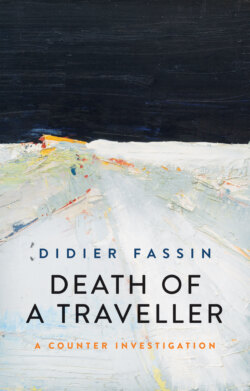Читать книгу Death of a Traveller - Didier Fassin - Страница 9
Terminological Note
ОглавлениеThe organization of law enforcement and the operation of the judicial system is specific to each country, and even sometimes to each jurisdiction within a given country, as in the United States. Some explanations are therefore in order so as to make the account that follows clear for readers unfamiliar with the French systems.
In France there are two main law-enforcement institutions, which have roughly equivalent authority but distinct legal status and territories of operation. The national police is a civilian force that operates within cities and on their outskirts. The national gendarmerie is a military force operating in rural areas and small towns. There are also municipal police forces under the authority of local mayors, whose role is more limited, complementing the two other forces. In this text the generic term “police” is used to refer to law-enforcement bodies. Angelo’s family, who live on a farm, have only ever had dealings with the gendarmerie, and the two who killed the young man were adjudants (non-commissioned officers), the first rank above beat officer. For the purposes of clarity, the translation uses the term officers for these two in order to distinguish them from the other gendarmes involved in the operation. All belong to an elite unit, the GIGN, or Groupe d’intervention de la gendarmerie nationale (National Gendarmerie Intervention Group), which was created to intervene in terrorist attacks, hostage situations and the fight against organized crime – in other words, circumstances very different from a simple arrest.
The judicial system in France, as in the majority of countries in continental Europe and their former colonies, is based on civil law, derived from Roman law, and thus quite different from the common law that operates in the United States, the United Kingdom and the Commonwealth. One notable feature is the stage of judicial investigation, prior to the trial at criminal court, that is instigated by the procureur de la République (public prosecutor), or requested by the victim(s), and is conducted by a juge d’instruction (examining magistrate). The latter’s role is to establish whether a breach of the law has been committed and whether there is evidence to support charging the perpetrator(s). At the end of her or his investigation, after having received a statement (réquisition) from the public prosecutor and the responses (observations) from the counsels, the magistrate draws up a ruling (ordonnance), which may be either a dismissal (non-lieu), in which case there is no trial, or a referral to the criminal court (renvoi) where the accused will be tried. A decision to dismiss may be appealed in the same way as a court decision. If the decision or verdict is upheld on appeal, there remains the possibility of a petition to the Court of Cassation, but this court rules only on points of procedure, not on matters of substance; if procedural problems are confirmed, this leads to a new trial. One final stage, when all internal means of recourse are exhausted, is to appeal to the European Court of Human Rights, if the appellant considers that her or his rights have been violated. If the European Court rules in favor of the plaintiff, it may issue a decision against the state in question, accompanied by a requirement to pay the appellant a sum corresponding to the legal costs and to the material and moral harm suffered. However, such a decision does not mean that the case has to be retried and therefore does not expose the individuals charged to any form of judgment or sanction.
The victims in the present case belong to the social group known as gens du voyage (travelling people). Determining the right way to name them is always a sensitive matter, for there are several words whose definitions and implications vary depending on context and speaker. The choice has been made here to respect the way the protagonists identify themselves. As far as Angelo and his family are concerned, most of them think of themselves simply as voyageurs (Travellers). The term may seem paradoxical given that they are settled, but it is noteworthy that, at the family property, a former farm, all prefer to sleep in caravans rather than in the buildings, testimony to a sort of nostalgia for a traveling way of life despite the fact that some of them have never known it. They sometimes use the term manouche when speaking about themselves, but never rom (Roma) or gitan (gypsy), since the former relates in their eyes to a specific community and the latter has pejorative connotations. While the translation of the book uses US English, the British English writing of the term “Traveller” has been preferred to differentiate it from the word “traveler,” which refers to a person who is traveling. The double “l” signifies the identity of a group.
